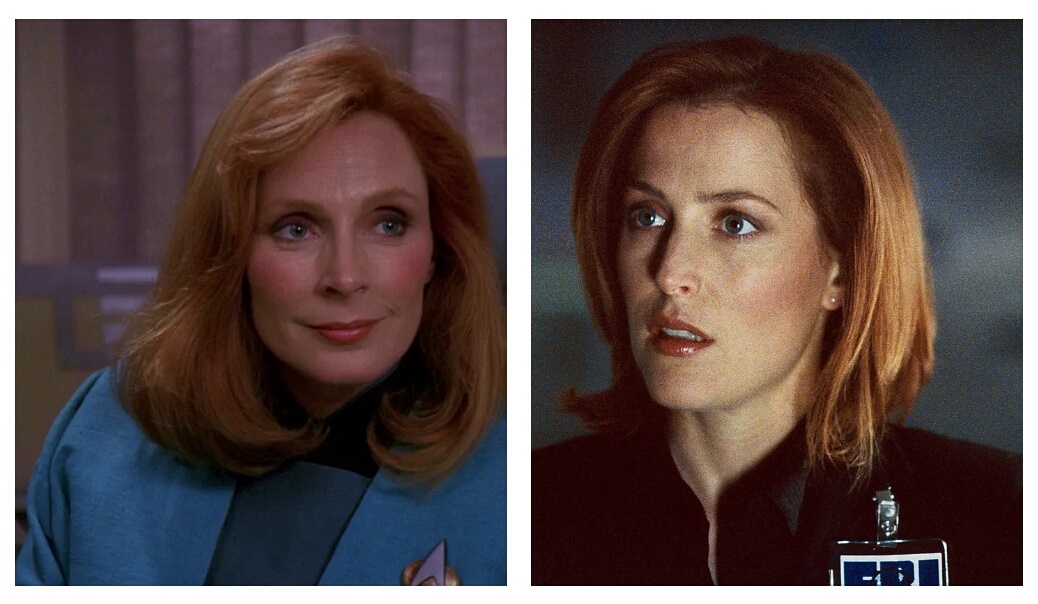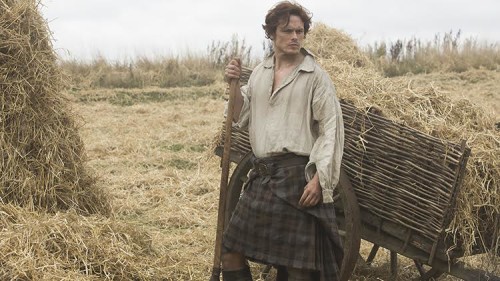This guest post written by Carly Lane appears as part of our theme week on Women Scientists. | Spoilers ahead.
In the vast, diverse spectrum of science fiction worlds, it often seems as if no role, no profession, is off-limits to female characters. To that end, it has often been cited as a deeply progressive genre for fictional women, depicting the importance of their contributions as being equal to their male counterparts. When compared alongside the investigation of extraterrestrial life or the exploration of worlds other than our own, a strong and competent woman doesn’t seem that extraordinary by comparison.
Although science-fiction has been guilty of relying on outdated sexist tropes on occasion, it should be celebrated for the avenues where female characters are allowed to become more developed and three-dimensional. It’s these women that we often look up to as role models, even though they sometimes come from a future very far away from our own. Two of those characters appeared on television shows which spanned nearly fifteen years — Dr. Beverly Crusher, from Star Trek: The Next Generation, and Dana Scully, from The X-Files. Maybe not surprisingly, there’s more that links these two fictional ladies than the fact that they share the same hair color, or that they both have backgrounds in STEM fields. Over the course of their respective programs, they were allowed to become fully realized characters who had journeys independent of any influence from men — and though both women do have important relationships with several men in their lives, it isn’t what defines them.

When we’re introduced to Dr. Beverly Crusher (Gates McFadden) at the start of The Next Generation we learn two things up front: first, that she’s a single mother to young son Wesley (Wil Wheaton), and second, that she has a personal history with Jean-Luc Picard (Patrick Stewart), who captains the Starfleet vessel the USS Enterprise. In spite of the tie that binds them, which is revealed to be the death of Crusher’s husband Jack, the doctor assures Picard that it will in no way affect “the way [she] serves [him], the vessel or the mission” as Chief Medical Officer (“Encounter at Farpoint”).
And, for the most part, it doesn’t — at least not early on. In fact, it seems like she’s barely joined on with the Enterprise before she accepts a position as head of Starfleet Medical less than a year later. Granted, the decision of the character was heavily informed by the departure of actress Gates McFadden at the end of season one; both McFadden and Crusher returned to the show for season three after fans campaigned to bring the character back. While the reason for Crusher’s return is never provided in dialogue, we see the toll her absence has taken — especially in her relationship with her son Wesley, who had remained on the Enterprise as acting ensign. The interactions between them are initially strained and awkward, and eventually Crusher goes to Picard to ask him about how her son has been during her time away (“Evolution”).
Mother and son don’t resolve their tension right off the bat, either; when Crusher suggests to Wesley that he might have taken on too many responsibilities, he snaps at her, invoking her absence. “I’m here now, Wesley,” she says, and over the course of the remaining episode Wesley allows himself to rely a little more on his mother for a change. It’s one of the few instances in TNG where Wesley does lean on Crusher in some way; more often than not, when it comes to asking for advice or venting his problems, we usually see Wesley seek out a male member of Starfleet, or even Guinan (Whoopi Goldberg), the proprietor of Enterprise’s bar Ten-Forward. Whether that was unintentional or stemming from the belief that an adolescent man shouldn’t be running to his mother with his problems, it definitely contributed to a number of missed opportunities for more meaningful interaction between Crusher and her son.
On the other hand, TNG doesn’t define Crusher solely by her role as a mother — and it shouldn’t. As Chief Medical Officer on the Enterprise, she’s the head of the team responsible for administering care not just to the other vessel’s crew members but also to the alien races they encounter over the course of their mission. Her background in science and medicine requires her to be familiar with unique anatomy, to develop cures for foreign illnesses, or to handle emergency medical situations with a calm demeanor. As a certified bridge officer, she is afforded command of the bridge on several occasions in the absence of other crew members. She has her own friendships forged outside professional boundaries, namely with ship’s counselor Deanna Troi (Marina Sirtis); the two women frequently go to each other for advice and recommendations. She also finds herself pursuing potential romantic attachments, though they don’t tend to last beyond the confines of an episode. And she even dances around a potential relationship with Picard, even though neither of them truly act on what appear to be mutual romantic feelings. Over the course of TNG, we’re afforded the opportunity to glimpse Crusher as a mother, a doctor, and a woman with feelings and strong convictions.
While Crusher’s journey begins as that of a mother and branches outward, the story arc of Dana Scully (Gillian Anderson) is something of the opposite. In The X-Files, it’s the skeptical Scully who serves as an avatar for the audience, our way in; it’s through her science that the FBI intends for her to debunk the X-Files and thereby discredit former golden boy Fox Mulder (David Duchovny) as a result. She’s immediately defined by her science, by her medical background; the frequency of Scully introducing herself by her profession in early seasons is a long-running joke among die-hard X-Philes, but there’s some part of it that’s almost necessary due to the occasional sexism she faces from men working in her field. When a male detective questions “the wisdom of assigning female law enforcement officers to certain types of cases” during a murder investigation, Scully assures him that his “concern” is misplaced (“2Shy”). Fortunately, she doesn’t find herself on the receiving end of any gross comments from her partner Mulder; although the two of them usually disagree on the whodunit, their verbal sparring matches are often a means to allow both parties to bounce potential hypotheses off one another.
It takes some time, but inevitably we learn that Scully occasionally harbors thoughts of having a social life, building relationships, and perhaps even starting a family someday outside of her work on the X-Files. Her attempts at dating never quite end the way she expects (“The Jersey Devil,” “Never Again”). Her alien abduction comes with its own set of side ramifications after Mulder learns that some of her eggs had been harvested during the process, eventually leading to the creation of a child (“Emily”). Scully experiences an overwhelming sense of connection with the girl and is heartbroken when Emily dies from a genetic infection, especially since this comes in the aftermath of Scully learning of her own infertility as the result of her abduction — or so she thinks.
Scully’s desire to be a mother again never truly goes away, and when she eventually decides to have a child through in vitro fertilization she asks Mulder to be the donor (“Per Manum”); although the initial attempt at in vitro fails, Scully later learns she is pregnant shortly after the alien abduction of Mulder, suggesting that the two were intimate long enough to conceive naturally (“Requiem”). While she is overjoyed to finally have a child of her own, Scully soon realizes that she and her son William will never find peace given the threats to his life that exist in her world, and makes the devastating decision to give him up for adoption so that he can grow up safely. In the revival of The X-Files, we learn that Scully frequently reminisces about the life she could have had with William if he had stayed with her, but the question of whether she will ever be able to reunite with her child even after all this time is still open-ended.
After all, as often as we’ve seen Scully try to leave the X-Files (and Mulder, by extension) behind and start anew, something always seems to occur to bring her back in somehow. And there’s value in that, in depicting a female character who wrestles with her convictions both as a woman of science and a woman of faith, in allowing her to explore her own wants and needs while not necessarily prioritizing that of her male partner’s. On The X-FIles, it never felt as though Mulder and Scully were on anything but equal footing; in his absence, she’s given the opportunity to fully champion the truth she had originally been assigned to dismiss.
The impact of Crusher and Scully cannot be understated, not just on the landscape of female representation on television or the portrayal of women scientists but the way they also drove young women to pursue STEM fields in reality. (Scully even has this effect partly named after her.) Maybe it’s because they’re impossible to sum up in just one word; they transcend mere descriptors like woman, lover, mother, caregiver, skeptic, scientist — because they’re all that and more. It’s the full representation of the many facets of their character that’s given these fictional women their long-lasting appeal for so many years already, and hopefully for many more years to come.
See also at Bitch Flicks: The Female Scientists of ‘The X-Files’; ‘Star Trek: The Next Generation’ Explores The Limits of Sexual Attraction in “The Host”; Sexual Desire on ‘The X-Files’: An Open (Love) Letter to Scully; Trill Gender and Sexuality Metaphors in ‘Star Trek’
Carly Lane is a writer based in New York City who specializes in obscure pop culture references and miscellaneous geekery. Her work has been featured on The Mary Sue, Teen Vogue, The Toast and more. You can find her on Twitter at @carlylane.







